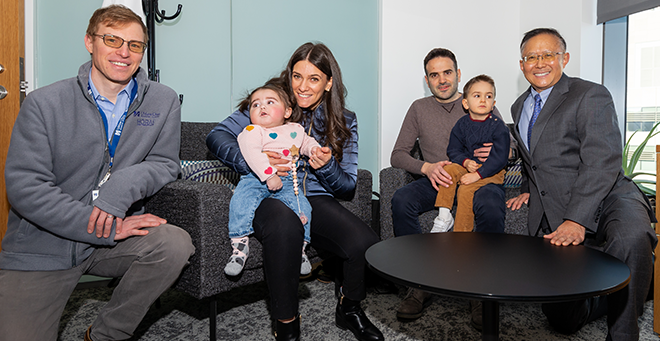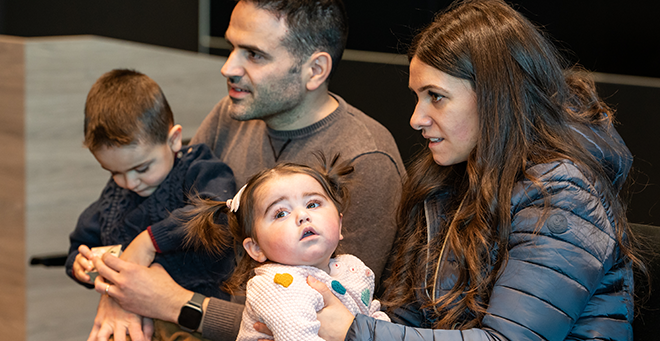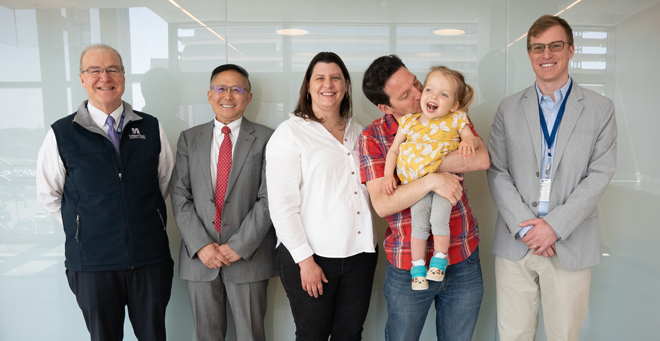
Photo: Phil Smith
The look on 17-month-old Giulia Iovieno’s face said it all to the research trainees gathered in the new education and research building on Dec. 13: The little girl from Italy, born with a gene mutation that causes Canavan disease, was holding her head up and directing her gaze to the people around her. That’s not something she could do just four months earlier.
But in August, she received gene therapy in the CANaspire clinical trial sponsored by Aspa Therapeutics, a BridgeBio company. Neurologist Florian Eichler, MD, is principal investigator on the trial being conducted at Mass General Hospital. The AAV9 vector gene therapy is based on research led by Guangping Gao, PhD, the Penelope Booth Rockwell Professor in Biomedical Research, chair and professor of genetic & cellular medicine, director of the Horae Gene Therapy Center and director of the Li Weibo Institute for Rare Diseases Research; and Dominic J. Gessler, MD, PhD’20, assistant professor of neurological surgery.
“You have to remember everything you do, day and night, is for a cause,” Dr. Gao told the young researchers. “This cause is this: can we develop therapy to save those babies and change their quality of life?”
Gao was recently named founding chair of the Department of Genetic & Cellular Medicine, incorporating the Horae Gene Therapy Center, which remains an entity under the new department. Scientists in the department are working on dozens of rare diseases, several of which have experimental gene therapies progressing through clinical trials.
The visit to UMass Chan by Giulia and her parents, Liberato and Michela Iovieno, and her 3 ½-year-old brother, Antonio, came about in part because of seat assignments on a flight from Rome to Boston last summer, in which the family serendipitously sat next to Jeanne B. Lawrence, PhD, the Leo P. and Theresa M. LaChance Chair in Medical Research and professor of neurology. The travelers started chatting and Dr. Lawrence said she was so excited to meet a young family who would be part of her colleagues’ career-long endeavor to cure Canavan. She immediately emailed Gao upon her arrival.

Photo: Phil Smith
“I was working on a grant, and I was so inspired that I was sitting next to these people, and they knew of Dr. Gao and the researchers’ work brought hope to them,” Lawrence said. “What they did for me is make it real.”
Michela Iovieno, Giulia’s mother, said she remembered seeing a picture of Gao and families of children with Canavan taken in 2013. Although her daughter wasn’t born yet, she said, “Our heart is in that picture.”
Liberato and Michela Iovieno, both engineers, faced the perplexing journey to their daughter’s diagnosis that is familiar to many families of children with rare diseases. Giulia appeared normal at birth, but she cried all day and night. Feeding her was difficult. Her mother was sure it was gastrointestinal reflux. Giulia’s development was normal for the first few months, but then she started to lose capabilities.
A year ago at Christmas, doctors in Italy discovered Giulia had a gene mutation for Canavan disease.
“The doctors said, ‘We’re sorry, you must take care because she has no medication (to treat it). You can hug her and kiss her as much as possible, because she has only a few years of life’,” her father said.
With the hospital’s help, the Iovieno family found the ASPA trial and the work led by Gao and Dr. Gessler. They came to Boston in June and Giulia received treatment in August.
Giulia is one of three children to receive the highest dose of the gene therapy.
“After the gene therapy, we start to see another baby,” her mother said. “Now I know Giulia can look into my eyes.”
Her father said, “She smiles a lot. She’s becoming a funny girl. Now she’s starting to produce sound with her mouth. And she’s able to eat—she loves Ritz Crackers.”
He added, “Regardless of whether the therapy works, works a little, or doesn’t work at all, we are living a fantastic experience, and we will always be grateful to Prof. Gao, all the researchers, doctors and nurses for the opportunity we have had.
“We feel lucky because we know children who are a little older than Giulia who unfortunately did not have this opportunity and we are sure that in the future children like Giulia will have a cure and will be able to lead a normal life.”
Looking back at the families with rare diseases who have participated in research and the progress that is being made, Gao told the trainees, “Keep dreaming. The dream may become true.”


